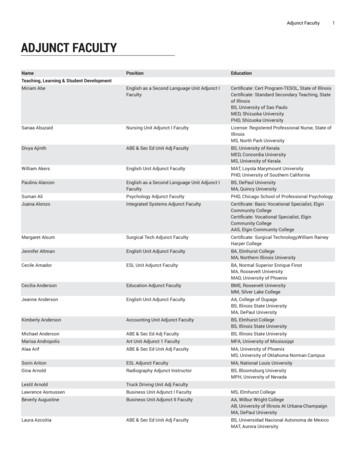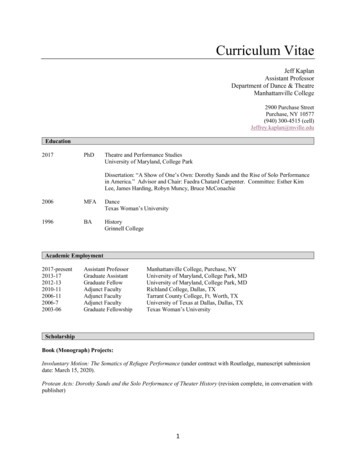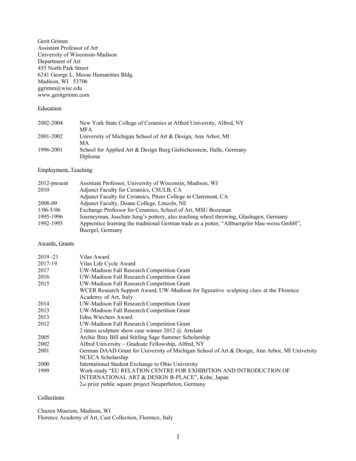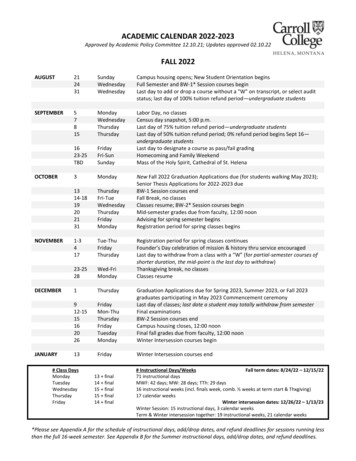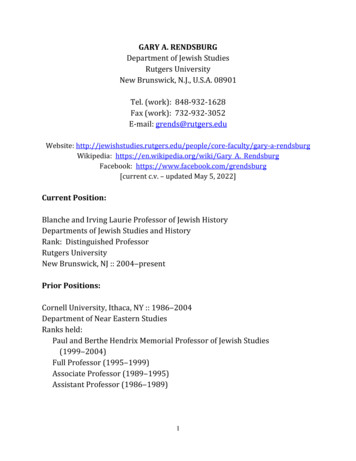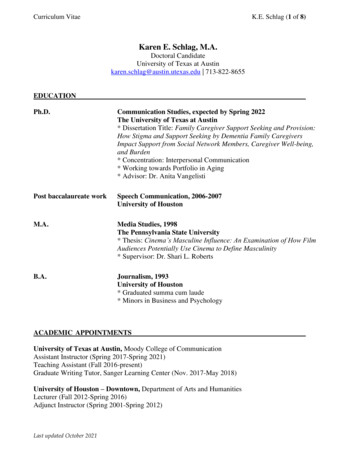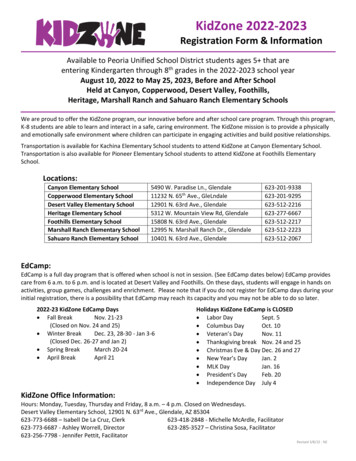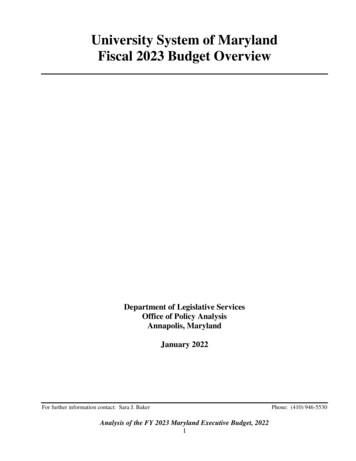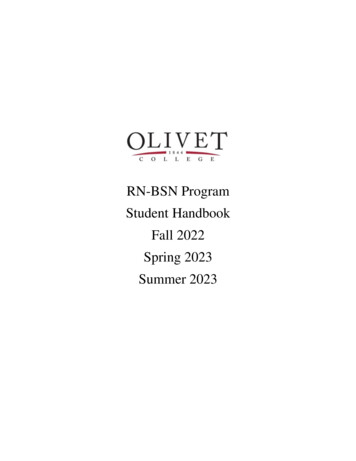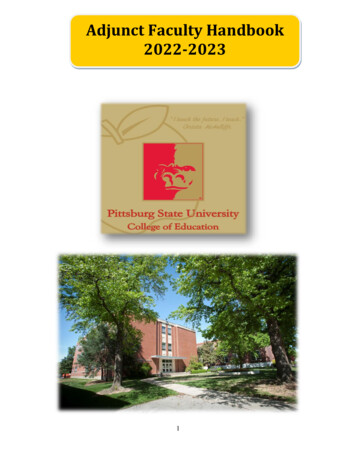
Transcription
Adjunct Faculty Handbook2022-20231
TABLE OF CONTENTSWelcome . 3University Mission and Vision Statement . 3College of Education Mission Statement. 3Classroom Procedures . 4Student records . 4Class Roster. 4Course Management System – Canvas . 4Attendance . 5Course Syllabus. 5Accommodations for Students . 5Student Access to Adjunct Faculty . 5Duplicating/Copying . 5Supplies . 6Awarding of Grades . 6Teaching Off Campus . 6Evaluation . 6Emergency Procedures. 6Student Rights and Responsibilities . 7Adjunct Faculty Rights and Responsibility . 7Emergency Numbers . 7Contact/Key Phone Numbers . 8Student Support Services . 9Axe Library . 9PSU Bookstore . 9Instructional Resource Center (IRC) . 10Appendix A - Initial Programs Knowledge Base . 11Appendix B - Advanced Programs Knowledge Base . 142
Welcome from the Dean of the College of EducationIt is our pleasure to welcome you to the College of Education at Pittsburg State University. As anadjunct faculty member, you bring a special expertise to our students and join us in preparingcompetent, committed, and caring professionals. We are proud of the reputation that we have builtthrough the dedication of a highly skilled faculty and staff and the constant pursuit of excellenceand we are blessed to have you become a part of this family.Hopefully this handbook will provide you with answers to some essential questions you may haveabout your appointment. This is not intended as a substitute for official policies of Pittsburg StateUniversity; it is a guide for assisting you in finding vital information and services available to you.Please do not hesitate to let us know how we can assist you. The entire staff wants to support youand help you be successful in any way we can. We appreciate your willingness to assist ourstudents and highly value the contribution you will make to their education. Again, welcome andhave a great semester!Dr. James E. Truelove, DeanCollege of EducationUniversity Mission and Vision StatementThe mission of Pittsburg State University is to provide transformational experiences for its studentsand the community. Pittsburg State University will be the first choice for: Students seeking a quality education through nationally recognized programs;The most talented faculty and staff seeing dynamic careers;Partnerships with communities, businesses, organizations, and individuals in the region;External investment by donors, grant makers, and government.Please access the following link for the e of Education Mission StatementThe mission of the College of Education is to prepare competent, committed, caringprofessionals, provide service to the various communities of which we are a part, and expand thebody of knowledge through research and dissemination ex.html3
Classroom ProceduresAs an adjunct faculty member, you are responsible for following our program requirements in thearea of classroom procedures, student records, class rosters, and grading procedures. r/index.html you will find our academic calendarfor the school year. This link has information on the list of classes, vacations, enrollment, finaldrop/add class dates, final exams, etc.Student RecordsThe Office of Registrar is in charge of all student records. Records generally include any recordsin the possession of the institution that contain information directly related to a student. The recordsmay be handwritten, electronic, or in some other format. Any type of student record must becompleted, compiled, and sent to the Office of Registrar so they can maintain current informationon student’s records. Please keep in mind the confidentiality of these records as set by the FamilyEducational Rights and Privacy Act (FERPA) of 1974. More information can be found on theOffice of Registrar’s site: Family Rights and Privacy Act - FERPA (pittstate.edu).Class RosterClass rosters list students which are enrolled and eligible to attend class. It is very important thatevery person in class is on the roster. Students not registered on the roster are not allowed to attendclass. Any student who does not appear on the roster should be directed by the instructor to checkwith the Office of the Registrar. To ensure that students receive the appropriate credit, pleasecheck the accuracy of your roster often. You can access the Class Roster by going to GUS Classic– Academic Administration – Web Roster (under Course Management).Course Management System – CanvasPittsburg State University has adopted course management software for faculty that is calledCanvas. For courses on campus it is an excellent tool for posting the course syllabus, assignments,grades, class presentations, and much more. Training on the use of Canvas is available bycontacting the Center for Teaching, Learning, and Technology at 620-235-4243 or by emailingsdellasega@pittstate.edu.All Online Courses use the Canvas management system. If you are teaching an online course,please contact Susan Dellasega (sdellasega@pittstate.edu) prior to the beginning of the semester.4
AttendanceStudents at Pittsburg State University are expected to attend class regularly and participate fullyin the activities of that class under the guidance of a university instructor. The instructor isresponsible for setting and communicating to the students the attendance requirements for eachclass.Course SyllabusA thorough, organized syllabus is one of the most important tools you have to communicatepertinent course information and expectations to your students. The components that a goodsyllabus must include, but are not limited to are: instructor information, course description andinformation/purpose, primary course objectives, required text and materials, requirements andevaluation, assignments and exams. It is important that your syllabus and grading procedures areconsistent with PSU’s policies. Therefore, a course syllabus will be provided by your departmentchair as well as a general review to ensure you meet all the necessary requirements for your classsyllabus. You are expected to follow the course syllabus and complete the necessary assessmentrequirements. A list of the required content for course syllabi, along with an optional syllabussupplement, can be found on the Office of the Registrar website plement.html.Accommodations for StudentsAuxiliary aids and services may be made available for students with qualified disabilities.Students who request special accommodations should be referred to the department chair. Thosereferrals should be documented and on file.Student Access to Adjunct FacultyFor On Campus courses adjunct faculty are expected to provide student access for conferencesand counseling at least 15 minutes before and after each class session. Additional sessions maybe arranged by appointment with either the adjunct faculty or the department chairperson.For Online Courses, adjunct faculty are expected to be in communication with students via emailand telephone. Please provide a telephone number where students can contact you concerningquestions about the course. You may limit the times students call by providing students withconference times via telephone, Canvas, Facetime, Google Handout, and/or Skype.Duplicating/CopyingAdjunct faculty may use university copiers for duplicating course materials. If needed, thesemay be duplicated for you if you will give the departmental office sufficient notice.5
SuppliesSupplies may be secured from the Department Chairperson or other designated persons. Anyspecial needs for a course should be brought to the attention of the Department Chairperson.Awarding of GradesGrades are earned by students and awarded by faculty. Grade changes can only be made by theinstructor with the approval of the Department Chairperson and the Dean of the college. Theuniversity policy on grading can be found at 192020/academic-regulations.html. Additionally, the adjunct faculty member should visit with theDepartment Chairperson about grading expectations.For both On Campus and Online Courses, adjunct faculty must submit final grades on GUS –Academic Administration – Web Grade Submission (under Course Management). Adjunctfaculty should be aware of the deadlines for grades (Monday following end of semester). Midterm grades must be submitted for all undergraduate students. A Mr. BulkE from the Registrar’sOffice will notify faculty when and how to submit these grades.Please https://www.pittstate.edu/graduate/policies.html Graduate School Policies for graduatecourses.Teaching Off CampusAdjunct faculty members who teach off campus are required to contact their department chair forclassroom arrangements, technology requests, and enrollment.EvaluationCourse evaluations for all faculty are administered online through the Center for Teaching,Learning and Technology. The Center for Teaching, Learning, and Technology asksdepartments to determine which courses they want evaluated and then when it is time to evaluatecourses, an online evaluation form is sent to students to complete.Emergency ProceduresEmergency evacuation procedures are posted in every building and published on the campuswebsite. In the event of an emergency, adjunct faculty should follow the posted proceduresand/or refer to the following policy: https://www.pittstate.edu/police/safety.html.If an emergency situation arises during class time with a student, try to defuse the situation ifpossible. Emergency numbers are listed on page 7 of this handbook.6
Students Rights and ResponsibilitiesThe following link has several policies listed for your review. These policies were adopted bythe PSU Student Senate and Faculty Senate and approved by the President.****Academic Misconduct/PlagiarismSexual AssaultDiscriminationDrug and tudent-rights-and-responsiblities.htmlAdjunct Faculty Rights and ResponsibilitiesThe Human Resources Department has outlined New Employee Information/Orientation on thefollowing website -orientation-checklist.htmlEach of the following subjects are accessible as links on the HRS website. Employee Information sheeto oyee-information.htmlIncome Tax Withholdingo gs.htmlDirect Deposit Authorization formo https://www.pittstate.edu/hr/forms.htmlComplete the above paperwork on or before your first day at work. Please submit to HumanResources, 204 Russ Hall, or fill out, print and send to:Pittsburg State UniversityHuman Resources1701 S. BroadwayPittsburg, KS 66762It is the responsibility of adjunct faculty to notify students if a class is cancelled due to facultyabsence.Emergency NumbersPittsburg Campus Police – (620) 235-4624 or 911Via Christi Medical Center Emergency Room – (620) 232-0123Suicide Prevention Hotline – (620)-232-SAVE (7283)7
Contact/Key Phone NumbersCollege Dean Office/College of Ed/Hughes Hall . Karen LaSota (620) 235-4517Academic Affairs/Russ Hall. . Bryronni Ferguson (620) 235-6170Admissions/Horace Mann .(620) 235-4251Financial Aid/Horace Mann . (620) 235-4240Health, Human Performance, and Recreation/SRC . Susan Downing (620) 235-4686Instructional Resource Center .Amanda Pride (620) 235-6105Learning Center/Student Health Center . (620) 235-4309Printing Services/U.S. Mail/Whitesitt Hall .(620) 235-4273Psychology and Counseling/Whitesitt Hall . Carol Oehme (620) 235-4522Registrar’s Office/Russ Hall . (620) 235-4200Teacher Education. . (620) 235-4489Teaching and Leadership. .Amanda Pride (620) 235-6105Testing Center/206 Whitesitt Hall .(620) 235-4267University Police . (620) 235-46248
Student Support ServicesCareer Counseling . Kim Hull (620) 235-4143University Counseling . (620) 235-4044Equal Opportunity and Affirmative Action. . .Megan Johnson (620) 235-4186Reporting Sexual Harassment/Discrimination . al-misconduct.htmlStudent Health Center . (620) 235-4452Student Success Center . Heather Eckstein (620) 235-4265Writing Center/Axe Library. (620) 235-4694Axe LibraryThe Leonard H. Axe Library provides all of the services one would expect in a traditional librarysetting and much more. The Library's physical holdings are supplemented with online resources:323,000 book titles with more than 12,000 in virtual collections, and more than 25,000 journaltitles, about 1,600 of which are readily available in house. The Government DocumentsDepartment alone maintains a collection of more than 500,000 items including books, periodicals,maps, charts, and posters on all topics.The Periodicals Department helps to tie online citations to holdings using one of two sources.Serials Solutions combines all of the Library's periodical holdings, either physical or virtual, com/ejp/index.html?libHash GQ8BR7RW2G#/?language en-US&titleType JOURNALS Article Linker tells you if the article cited on one databaseis available full text in another, and quickly takes you to it.Phone number: (620) 235-4894 Website: https://axe.pittstate.edu/PSU BookstoreThe requisite readings for your course noted in the syllabus will be available for students in thebookstore. Your department chair/director will assist in ordering your textbooks. The PSU GorillaBookstore is found on the main floor and basement of the Overman Student Center. Phonenumber: (620) 235-48759
IRC/Instructional Resource CenterThe Instructional Resource Center (IRC) located in B25 Hughes Hall serves as a majorinstructional resource in all areas of teacher and school service personnel preparation. The ml. While its primary use has been by prospective teachers, it is designed to serveexperienced teachers and administrators of school systems in the service area of Pittsburg StateUniversity.The IRC occupies approximately 2200 square feet of floor space with facilities to accommodatesubstantial numbers of students in the main library area with conference, audio-visual, andindividual work spaces provided. Services available for student's use include a photocopier,laminating machine, computers, and printers. A wide variety of instructional resource materials isavailable.The primary purpose of the IRC is to provide experience with unit planning, wise selection,organization and effective use of multiple instructional resources, and to encourage curriculumdevelopment and improvement.Phone number: (620) 235-6160 or (620) 235-610510
APPENDIX AInitial Programs Knowledge BaseThe College of Education has developed what is referred to as a knowledge base whichencompasses the knowledge, skills, and dispositions which we want developed in each prospectiveteacher.THE LEARNER AND LEARNINGProfessional educators must understand that learning and development patterns varyamong individuals, that learners bring unique individual differences to the learningprocess and that learners need supportive and safe learning environments to thrive.1. The candidate knows how learning occurs (how learners construct knowledge, acquire skillsand develop disciplined thinking processes) and how to use instructional strategies thatpromote individual growth.2. The candidate understands that cognitive, linguistic, social, emotional and physicaldevelopment influences learning.3. The candidate understands and identifies differences in approaches to learning andperformance and designs experiences that incorporate individuals’ strengths to promotegrowth.4. The candidate understands students with exceptional needs and knows how to use strategiesand resources to meet these needs.5. The candidate knows how to access information about the values of diverse cultures andcommunities and how to incorporate languages, experiences, cultures and communityresources into practice.6. The candidate understands how to manage the learning environment by organizing,allocating and coordinating the resources of time and space.7. The candidate knows how to design experiences using strategies that enhance learnermotivation and engagement.8. The candidate understands the processes needed to foster a respectful learning community.11
APPENDIX A (Continued)CONTENTProfessional educators must have a deep and flexible understanding of the field and be ableto draw upon the central concepts and structures of their discipline as they work withlearners. They integrate cross-disciplinary skills (e.g., critical thinking, problem solving,creativity and communication) to help learners apply content to propose solutions, forgenew understandings, solve problems and imagine possibilities. Professional educatorsconnect information to local, state, national and global issues.9. The candidate understands that learners should question, analyze and understand conceptsfrom diverse perspectives.10. The candidate has a deep knowledge of student content standards and learning progressionsin the discipline(s).11. The candidate knows how to use supplementary resources and technologies effectively toensure accessibility and relevance for all.12. The candidate understands how disciplinary knowledge can be applied as a lens to addresslocal and global issues.13. The candidate realizes that content knowledge is not a fixed body of facts but is complex,culturally situated and ever evolving. S/he keeps abreast of new ideas and best practices inthe field.14. The candidate knows major concepts, assumptions and debates that are central to thediscipline.INSTRUCTIONAL PRACTICEProfessional educators understand and integrate assessment, planning and instructionalstrategies in coordinated and engaging ways for effective practice. They understand how todesign, implement, interpret and communicate results from a range of assessments.15. The candidate knows how to engage learners in multiple ways of demonstrating knowledgeand skills as part of the assessment process.16. The candidate understands the positive impact of effective descriptive feedback and knows avariety of strategies for communicating this feedback.17. The candidate knows how to engage learners actively in the assessment process and todevelop each learner’s capacity to reflect on and communicate about their individualprogress.18. The candidate understands the theories and processes of curriculum design (appropriatesequencing, developmentally appropriate instruction, builds on learners’ prior knowledgeand experiences).12
19. The candidate understands the process for aligning instruction and assessment with learningtargets.20. The candidate understands how theory, research and best practices impact ongoing planningand instructional practice.21. The candidate knows how to engage learners in using technology tools and a range of skillsto access, interpret, evaluate and apply information.22. The candidate knows how to incorporate a variety of strategies that stimulate the cognitiveprocesses associated with various kinds of learning (e.g., critical and creative thinking,problem framing and problem solving, invention, memorization and recall).23. The candidate knows how to apply a variety of developmentally, culturally and linguisticallyappropriate instructional strategies to achieve learning targets.24. The candidate knows how to analyze assessment data to understand patterns and gaps inlearning, to guide planning and instruction and to provide meaningful feedback.PROFESSIONAL RESPONSIBILITYProfessional educators create and support safe, productive learning environments. Theymust engage in meaningful and intensive professional learning and self-renewal byregularly examining practice through ongoing study, self-reflection and collaboration.Professional educators contribute to accomplishing their school’s mission and goals anddemonstrate leadership by modeling ethical behavior, contributing to positive changes inpractice and advancing their profession.25. The candidate knows how to use information and technology ethically, legally and safely.26. The candidate understands and knows how to use a variety of self-assessment and problemsolving strategies to analyze and reflect on his/her practice and to plan for adaptations/adjustments.27. The candidate understands laws related to learners’ rights and teacher responsibilities (e.g.,IDEA, FERPA, mandated reporting, etc.).28. The candidate understands schools as organizations within a historical, cultural, political andsocial context and knows how to work with others across the system to support learners.29. The candidate knows how to contribute to a common culture that supports high expectationsfor student learning.30. The candidate understands the expectations of the profession including codes of ethics,professional standards of practice and relevant law and policy.31. The candidate knows how to communicate effectively with all members of the learningcommunity.13
APPENDIX BAdvanced Programs Knowledge BaseThe College of Education has also developed a graduate knowledge base which encompasses theknowledge, skills, and dispositions which we want developed in each educational professional inour advanced programs.Professionalism - Candidates will demonstrate specific behaviors which reflect professionalattitudes, values and beliefs.1. Acts with integrity and fairness.2. Participates in ongoing professional development.3. Maintains confidentiality at all levels.4. Assumes leadership roles as appropriate.Collaboration – Candidates will collaborate with all stakeholders.5. Utilizes multiple collaborative strategies in developing effective communication.6. Transforms ideas into action through effective team building.7. Demonstrates a high level of proficiency in interpersonal skills, oral and writtencommunication.Practice – Candidates will demonstrate competency in the chosen field of study8. Demonstrates the ability to make decisions based upon data and input from stakeholders.9. Utilizes critical thinking skills to solve problems.10. Prioritizes tasks and manages time efficiently.11. Demonstrates specialized preparation in specific area of study.12. Tailors appropriate technologies to support practice.13. Uses existing educational research to inform and guide practice.14. Demonstrates global awareness by responding appropriately to larger political, social,economic and cultural issues.14
Assessment – Candidates will evaluate, implement and interpret data within educationenvironments.15. Uses appropriate technologies to support assessment practice.16. Evaluates knowledge and performance by using multiple methods of assessment.17. Adheres to ethical and unbiased assessment practices.18. Collects, critically analyzes, and interprets all types of assessment data in order to transforminformation into actionable, ethical practice.15
- Academic Administration - Web Roster (under Course Management). Course Management System - Canvas Pittsburg State University has adopted course management software for faculty that is called Canvas. For courses on campus it is an excellent tool for posting the course syllabus, assignments, grades, class presentations, and much more.

